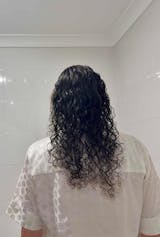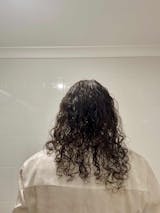
How today’s stress could damage tomorrow’s hair
If you’re experiencing thinning hair or a general decline in hair
health, can you identify a period of stress 3 - 6 months ago?

Stress Hair. What is it and what you can do about it.
The human body is a masterpiece. Hundreds of functions operating simultaneously, each serving the next. Our bodies are powerhouses where innumerable systems coexist in a perfect and delicate balance to convert, transfer, regulate, produce and serve.
Within this architecture, hormones are our chemical messengers, forming part of the body’s information superhighway.

Hormones regulate important functions such as:
- growth and development
- metabolism
- water and electrolyte balance
- sexual function and reproduction
- mood
Whether male or female, within us there are over 50 different hormones, working together in a delicate balance.
They're produced, released and regulated by our endocrine system and other organs and tissues. Have heard of glands such as the pituitary, thyroid, parathyroid, adrenal, and pineal glands? Along with our reproductive organs (ovaries and testes), and other key organs, in a healthy body hormones all work harmoniously as conductors of a delicate symphony.
When it comes to hair, we know that it grows from our follicles - the root of our hair - and we need our hair follicles to be functioning correctly for optimum hair health.
Hormones like cortisol influence the type and quality of hair developed by our follicles.
When it comes to supporting structures of the hair, hormones are also involved; for example, the sebaceous glands in our scalp produce sebum (oil) to lubricate, hydrate and protect the hair.
When the balance of hormones is interrupted, we have an imbalance - and a direct result of this can be seen in our hair condition.
Cortisol – the stress hormone – and hair
Cortisol, a hormone directly related to hair health, is released during times of stress to prepare the body to adapt to that stress.
Affecting the function and regulation of our hair follicles, cortisol overproduction gives legitimate biological basis to the adage “my hair is falling out from stress”.
Acute stress from an accident, child birth or surgery, as well as chronic stress from a marriage breakdown, workplace stress or moving home, can greatly influence hair loss and is known as telogen effluvium. Of course many women are all too familiar with postpartum hair changes too.
With acute stress, hair loss tends to happen 3 - 6 months after the event, almost like clockwork
Telogen effluvium will first become obvious by an increase in the shedding of the hair, and is exacerbated by a slowing of hair regrowth. The more chronic the stress, the longer the slowed hair growth.
Stress is also responsible for the generation of free radicals in the body. Free radicals are unstable atoms that can damage cells and are linked to ageing and a host of diseases. When the levels of free radicals versus antioxidants is out of balance, our body experiences oxidative stress. This oxidative stress speeds up the ageing process with free radicals attacking the DNA cells and proteins important for keeping our skin, hair and nails in prime condition. Free radicals tend to gather in pockets within the body, making hair follicles, the pocket in which the hair root sits, an optimum location. When here in abundance, free radicals may lead to hair loss and/ or greying. Enter the other adage “my hair is going grey from stress”.
Stress can trigger other types of hair loss like androgenetic alopecia and autoimmune hair loss because of cortisol’s relationship with our other hormones.
How can we combat hair conditions associated with stress?
If we consider that hair health is one piece of a larger picture (the body), and that different bodies require different approaches to nutrition and stress-relief, there isn't, nor will there ever be, a ‘one size fits all’ solution.
- As a minimum, look to find some 'unwind time' in every day, learn to meditate, eat nutritiously and, where required, supplement with targeted nutrition.
- Getting to know the root cause of your stress is always beneficial too. Stresses have their unique set of causes and accelerators, and therefore treatments.
- Always work with a healthcare practitioner to identify the cause of any hair health challenges, obtaining personalised advice to help you overcome them.
- Addressing the root cause as opposed to just the symptoms will help treat the challenge longer-term.
- Given that hormonal issues are systemic in nature, the most effective treatments are internal.

Stress hair and supplements
Consulting with a naturopath, hair nutritionist or trichologist and using high quality Australian-made supplements can help you manage your condition. By getting on top of your stress and addressing your nutrition, you can start to turn things around.
Apotecari's intensive hair growth and repair supplement Mane Event is a great option. Formulated to improve hair follicle proliferation, Mane Event also helps to fight off free radical damage with a daily dose of antioxidants. Vitamin B6 found in Mane Event also supports the function of the nervous system which can support the body's response to stress.








